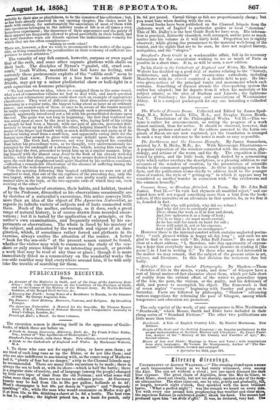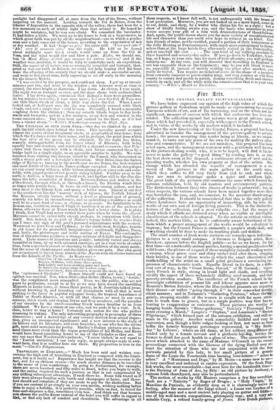rittrar4 eltattings.
triconaretbrry or ALPINE WEATEER.—" The evening closed upon a scene of such transcendent beauty as we had rarely witnessed, even among the Alps. The sun set without a cloud ; not one speck dimmed the dark blue expanse. The great chain of Aiguilles, from the Mer de Glace, to Mont Blanc, stood out clearly, but not too sharply, against a sky of the deep- est ultramarine. The stars came out, one by one, gently and gradually, till, at length, towards eight o'clock, they sparkled with the most brilliant lustre. What a perfect night' ! was the remark we heard on every side. Yet with every one around him prophesying fine weather and clear skies, the sagacious Ballast celebrated guide] shook his head. The sunset had produced upon him drdle d'efot.' It was, he declared, very bad. Ms sunlight had disappeared all at once from the foot of the Dome, without lingering on the summit. Looking towards the Col de Balme, from the Glacier d.'Argentiere to the opposite side of the valley, there had been for a few moments an arch of whiter light than that around it. He hoped he might be mistaken, but he was sore ufraid. We consulted the barometer. It had fallen a little. We went up to his house to look at a hygrometer, in which great faith was put by all the neighbourhood—one in which a gentle- man and a lady came out of the house, according to the expectation of wet or dry weather. It hadbouge an pen,' his sister said. • Vers quel NW' r 'AM vers is menials cjttl,' was the reply. Ile told us he feared about midnight some black clouds would come up from the Col de Von, and the wind would rise and blow a gale. En fin, we should see, but le Mont Blanc nYtait pas comma lee cadres courses,' and if the weather were doubtful, it would be folly to undertake such an expedition. Still, the aspect of all nature was so unusually beautiful and tranquil, that, great as was our faith in Balmat, we could not help hoping that his fears were the offspring of his anxiety that we should make a successful.aseent, and went to bed about nine, fully expecting to set off early in the morning for the Gran& Mulcts.
"I was excited by the prospect, and could not sleep. I got up at twenty minutes past ten, and went to the window ; the heavens- were as clear as crystal, the stars bright as diamonds. I lay down. At eleven, I rose again. The night was as tranquil as ever, and the stars shone with undiminished lustre. I lay down again, convinced that Baltuat's fears were groundless. At ten minutes to twelve, I rose once more; lo ! over the Col de Vosa was one thin black streak of cloud, a little way above the Col. When I next looked out, at half-past one, the sky was completely covered with black clouds and not a single star could be seen. Presently, I heard a mournful soughing down the chimney ; then my outside blinds began to flap back- wards and forwards ; and in a few minutes, every door and window in the house seemed alive. The trees bent and rustled in the blast, as if it had been a winter storm."— Wills's Wanderings among thc High Alps.
THE CYCLADES AS SEEN MOM SIT/A.—One day we climbed by a stony path the hill which rises behind the town. This specular mount occupies :demist the centre of that imaginary circle, or geographical ring-fence, from which the Cyclades derive their name, and is, perhaps, the point from which the best view of the group can be obtained. To the right lies Delos, scarcely distinguishable from the larger island of Rhenma; both being equally bare and desolate, and separated by a channel so narrow, that Poly- crates tied them together with a chain, and Icicles connected them by a bridge built in a single night, as an agreeable surprise to Apollo. We were deterred from visiting this famous island by the Consul, who threatened us with a steady gale and a fortnight's detention. Over Delos rises the barren ridge of Myconos; turning to the north-east we see Tenos, the best-watered and most fertile of the islands, Naxos perhaps excepted. On its steep slopes we can count many villages, white houses among green vineyards and corn- fields, with jagged peaksof red granite rising behind. Further away to the north is Andros, a huge mass of bold rock, and further still in the dint dis- tance the lofty mountains of Eubma. Between Eubwa and Andros is the d'Oro Strait, through which, as through a funnel, the Etesian winds blow at times with terrific fury. It bears an evil repute among sailors, aud has been fatal to the Oilcan .Ajax and many a better man. Almost at our feet to the north-west lies the narrow' rock of Gyaros, the Norfolk Island of the Romans, utterly barren, without a level or pleasant spot of ground, scarcely six miles in circumference, and as uninviting a residence as could well be to a man fond of ease, or change, or pleasure. Its familiarity to the Roman ear, doubtless, induced Virgil to mention it as one of the anchors of Delos, otherwise Syra or Tones would have had a better claim. It is plain I think, that Virgil had never visited these parts when he wrote the ,Eneid. Myconos cannot be called lofty except, perhaps, in comparison with Delos itself. But, indeed, in no part of .N.neas's voyage before he reaches Italy can I trace any sign of the poet's personal acquaintance with the scenery. Westward we have Ceos and Cythnos ; to the south-west, Scriphos, 'famous in old times for its proverbial insignificance ; southward, Siphnos, Pains, and, lastly, the picturesque and noble outline of Naxos. The contempla- tion of this panorama produces a strange mixture of delight and disappoint- ment. These masses of limestone and granite, infinitely varied and always beautiful in form, lit up with splendid sunshine, set in a vast circle of cobalt blue, form a spectacle as rare as charming to the children of the misty north; but the sense of abandonment and desolation gives one pain. Our own poets are accustomed to invest these islands of the -Egean with attributes borrowed from the Islands of the Pacific. As Keats says- - • Chief isle of the embowered Cy-elides,
Rejoice, 0 Delos, with thine olives green. And laurels and lawn-shading palm and beech. In which the zephyr sings the loudest song, And hazel thick, dark-stemmed, beneath the shade, Sze.'
The 'embowered Cyclades ' ! Homer himself could not have found an epithet less merited. Nor, when Ovid called Mollie (Malta, to wit,) fertile,' was the compliment more misapplied. Even we, the public, who are not poets by profession, except in so far as we may have wooed the unwilling 1r ern in Latin verse, at times think poetry, as M. Jourdain talked prose, without knowing it, and investing our dreamlands with all that is most striking to the fancy in popular voyagers' books, the tropical luxuriance of Tahiti or South America, or with all that charms us most in our own scenery, thick woods and sloping lawns and deep meadows, call the paradise of our creation by the sweet-sounding Greek names familiar to us from childhood. We have a vision of our own, and we undo it by a visit. Is it, then, better to stay at home ? Certainly not, unless for one who prefers dreaming to waking. The only interesting geography is geography of three dimensions ; and a knowledge of any country derived from actual inspec- tion, gives an unsuspected significance and a new interest to the study of. its history and its literature, and even furnishes, to one who has the divine gift, more solid materials for poetry. Shelley's Italian pictures are a thou- sand times more vivid than the vague generalities of his Hellas, and Keats would have found something better to say of the Cyclades as they are. If any One says that Wordsworth's palinode, 'Irsrrow visited,' is not equal to the 'Yarrow unvisited,' I can only reply, as people always reply to awk- ward facts, that it is neither here nor there. My proposition is true in the main."—Clark's Peloponnesus.
TRAVELLING ix ENGLAND. — " Much has been said and written con- cerning the high cost of travelling in England as compared withthe Conti- nent, but is it really. FO ? Experience has taught me that the reverse is the fact, and fcr an obviout reason—the much shorter distance to be travelled to the scene of your wanderings. In going to Switzerland, for example, there arc seven hundred and fifty miles to Basel, before you begin to walk, and the outlay required for such a journey as that is not compensated by any trifling subsequent advantage, if such there be. Some folk travel as if they were always familiar with turtle and champagne at home, and there- fore should not complain if they are made to pay for the distinction. But if you are content to go simply on your own merits, wishing nothing better than to enjoy a holiday, it is perfectly possible, while on foot, to travel for four-and-smpence a day, sometimes even less. And think not that because you choose the public-house instead of the hotel you will suffer in regard to dset, or find any lack of comfort and cleanliness. The advantage in all these respects, as I know full well, is not unfrequently with the house of least pretension. Moreover, you are not looked on as a mere biped, come in to eat, drink, and sleep, by a waiter who claims his fee as a right; but a show of kindly feeling awaits you, and the lassie who ministers to your wants accepts your gift of a coin with demonstrations of thankfulness. And, again, the public-house shows you far more variety of unsophisticated life and character than you could ever hope to witness in an hotel. Cer- tain friends of mine, newly-wedded, passed a portion of their honeymoon at the Jolly Herring at Peunmeutnawr, with much more contentment to them- selves than at the large hotels.they afterwards visited. in the Principality, and at oneshalf the cost The sum total of my walking amounts to three hundred and seventy-flys miles. If you go down to Yorkshire, trust. jag, as I hope, to your own legs for most ()flour pleasance you will perhaps outstrip me. At any rate, you will discover that travelling in England is not less enjoyable than on the-Continent . may be you will think it more so, especially if, instead of merely visiting one place after another, you really do travel. You require no ticket-of-leave in thessluipe of a passport from cowardly emperor or priest-ridden king, and may journey at will from county to county and parish to parish, finding something fresh and ohms_ teristie in each; and all the while with the consciousness that it is your owe country."—IPhite's Month in Yorkshire.



























 Previous page
Previous page